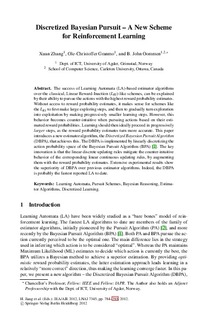| dc.contributor.author | Zhang, Xuan | |
| dc.contributor.author | Granmo, Ole-Christoffer | |
| dc.contributor.author | Oommen, B. John | |
| dc.date.accessioned | 2012-08-08T08:29:10Z | |
| dc.date.available | 2012-08-08T08:29:10Z | |
| dc.date.issued | 2012 | |
| dc.identifier.citation | Zhang, X., Granmo, O.-C., & Oommen, B. (2012). Discretized Bayesian pursuit – A new scheme for reinforcement learning | no_NO |
| dc.identifier.isbn | 978-3-642-31086-7 | |
| dc.identifier.uri | http://hdl.handle.net/11250/137961 | |
| dc.description | Published version of a chapter in the book: Advanced Research in Applied Artificial Intelligence. Also available from the publisher at: http://dx.doi.org/10.1007/978-3-642-31087-4_79 | no_NO |
| dc.description.abstract | The success of Learning Automata (LA)-based estimator algorithms over the classical, Linear Reward-Inaction ( L RI )-like schemes, can be explained by their ability to pursue the actions with the highest reward probability estimates. Without access to reward probability estimates, it makes sense for schemes like the L RI to first make large exploring steps, and then to gradually turn exploration into exploitation by making progressively smaller learning steps. However, this behavior becomes counter-intuitive when pursuing actions based on their estimated reward probabilities. Learning should then ideally proceed in progressively larger steps, as the reward probability estimates turn more accurate. This paper introduces a new estimator algorithm, the Discretized Bayesian Pursuit Algorithm (DBPA), that achieves this. The DBPA is implemented by linearly discretizing the action probability space of the Bayesian Pursuit Algorithm (BPA) [1]. The key innovation is that the linear discrete updating rules mitigate the counter-intuitive behavior of the corresponding linear continuous updating rules, by augmenting them with the reward probability estimates. Extensive experimental results show the superiority of DBPA over previous estimator algorithms. Indeed, the DBPA is probably the fastest reported LA to date. | no_NO |
| dc.language.iso | eng | no_NO |
| dc.publisher | Springer | no_NO |
| dc.relation.ispartofseries | Lecture Notes in Computer Science;7345 | |
| dc.subject | learning automata | no_NO |
| dc.subject | pursuit schemes | no_NO |
| dc.subject | Bayesian reasoning | no_NO |
| dc.subject | estimator algorithms | no_NO |
| dc.subject | discretized learning | no_NO |
| dc.title | Discretized Bayesian pursuit – A new scheme for reinforcement learning | no_NO |
| dc.type | Chapter | no_NO |
| dc.type | Peer reviewed | no_NO |
| dc.subject.nsi | VDP::Technology: 500::Information and communication technology: 550 | no_NO |
| dc.subject.nsi | VDP::Mathematics and natural science: 400::Information and communication science: 420::Algorithms and computability theory: 422 | no_NO |
| dc.source.pagenumber | 784-793 | no_NO |
